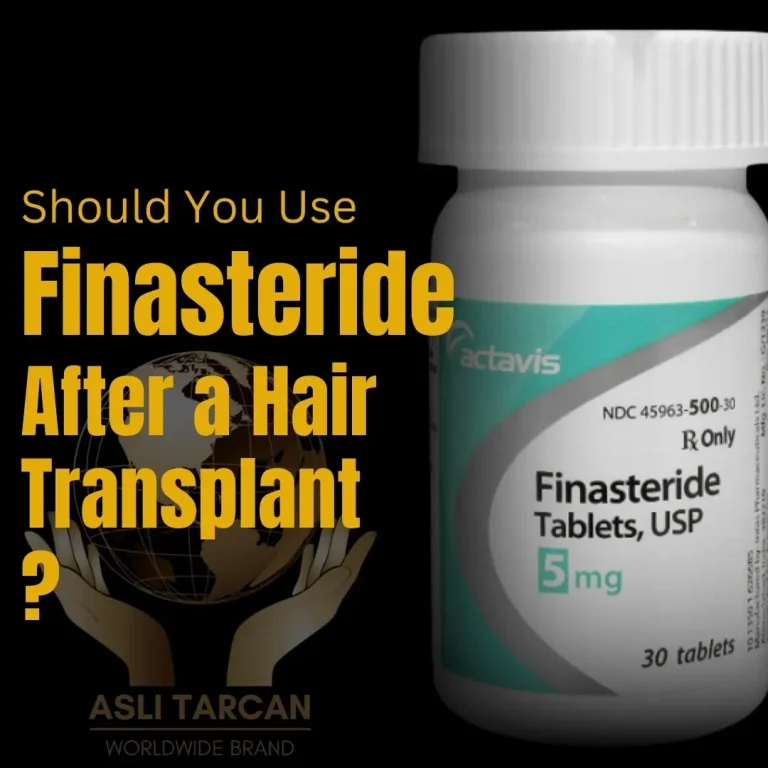What Vitamin Should I Take for Hair Growth Naturally?
Hair loss and baldness affect a large number of individuals. Though shampoos and oils are assistive in some way, hair must also require internal support. Therefore, nutrients are major factors influencing the strength of hair.
What vitamin should I take for hair growth is a question many people ask when looking for a solution. This blog explains which nutrients help with growth and how they work. It also covers how vitamin deficiencies lead to hair loss. You will learn about vitamins for hair growth and thickness and how to add them safely.
The guide also compares food sources and hair growth tablets and helps you choose supplements for hair loss in females. Each section provides facts that can improve your daily routine.
Why Nutrition Matters for Hair Health
Hair consists of keratin and the body requires protein and vitamins to synthesize it. Without nutrients, the growth phase shortens and hair sheds early or grows back thin.
According to a study;
- Vitamin gaps lead to hair fall
- Protein and B vitamins feed hair roots
- Low iron or vitamin D weakens the roots
Lack of nutrition often links to:
- Fasting or crash diets
- Gut problems
- Stress
- Hormone imbalance
Eating better helps and many people also try hair boosting supplements with food. This supports scalp health and can help reduce daily hair loss.
See Also: How To Tell If You Will Go Bald
Which Vitamin Deficiency Causes Hair Loss?
Some key nutrients affect hair growth, when levels are low:
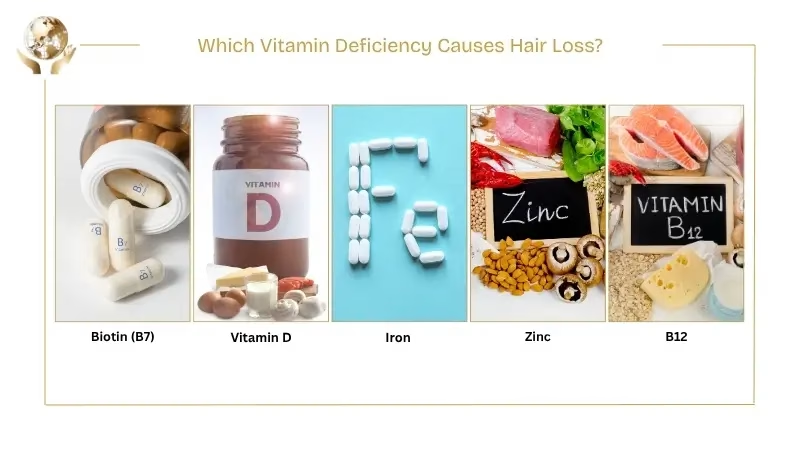
- Biotin (B7)
- Vitamin D
- Iron
- Zinc
- Vitamin B12
Here is what they do:
| Nutrient | Role in Hair Health |
|---|---|
| Biotin | Strengthens roots and stops breakage |
| Vitamin D | Starts new follicle growth |
| Iron | Helps red cells carry oxygen |
| Zinc | Supports scalp oil and cell repair |
| B12 | Helps new cells form and grow hair |
Hair loss from low iron or other vitamin deficiencies is more common in women. A blood test shows low levels and hair fall vitamin supplements fill the gap when food is not enough.
See Also: Hair Breakage
Signs of Hair Loss Vitamin Deficiency
If your body lacks nutrients, you may see changes in your hair. These signs show up in 6 to 12 weeks.

Common signs:
- Hair feels thin or flat
- Excess hair in brush
- Slower hair growth
- Pale skin or fatigue
- Brittle nails or dry scalp
Check your blood levels if these signs stay. Using a daily hair fall vitamin may help stop the loss. Always pair this with a good diet and normal sleep.
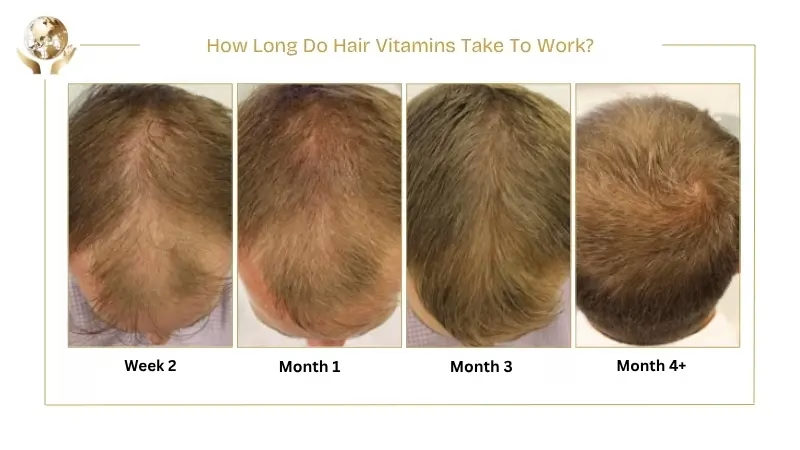
How Long Do Hair Vitamins Take To Work?
However, hair growth takes time. Vitamins help but results do not happen overnight and most users see change in 2 to 4 months.
What to expect:
- Week 2: Less hair fall.
- Month 1: Hair feels stronger.
- Month 3: New strands begin to appear.
- Month 4+: Hair looks fuller and healthier.
The main rule is consistency; make sure you take supplements regularly and combine them with wholesome food and sleep. Water intake and stress control also matter.
Tracking your photos monthly helps check progress and if no result in 6 months speak to a doctor.
What Are The Best Vitamins For Hair Growth & Thickening?
Some vitamins help make strands thicker and longer. They support scalp cells and prevent weak roots.

Key vitamins:
- Vitamin A – Helps scalp stay moist.
- Vitamin D – Wakes up hair roots.
- Biotin (B7) – Forms keratin for new hair.
- Vitamin E – Protects cells from stress.
- Vitamin C – Builds collagen and uses iron well.
These nutrients work together to strengthen hair and promote healthy growth.
Biotin: How Much to Take Daily for Hair Growth
Biotin helps make keratin. It supports thicker strands and less breakage. People with hair fall often use this daily.
How much biotin to take daily for hair growth, depends on age and goal. Most adults take 30 mcg to 100 mcg, while those focused on hair regrowth may take 2500 mcg to 5000 mcg.
Low biotin signs:
- Hair shedding
- Dry skin
- Brittle nails
Food sources include:
- Eggs
- Almonds
- Seeds
- Sweet potatoes
Biotin is found in many hair growth tablets and chewables. Look for products with zinc or vitamin C. These support better use of biotin in the body.
Vitamin D for Hair Growth
Low vitamin D for hair growth links to slow or weak regrowth. It supports new follicles and keeps current ones active.
Facts:
- Lack of sun leads to low D levels.
- People with alopecia often lack vitamin D.
- D3 is better than D2 for daily use.
Sources:
- Sunlight
- Salmon and sardines
- Eggs and liver
- Fortified drinks
Many best supplements for hair growth and thickness have 600 to 2000 IU of D3. This helps hair in the growing phase. Long-term use should be supervised by a doctor.
See Also: How To Protect Hair From Sun
Vitamin A, E, and C & Their Role
These three vitamins protect hair and help form strong fibers. They keep the scalp healthy and support the repair cycle. They are also commonly found in hair growth and thickness blends, supporting both the scalp and hair shaft.
- Vitamin A – Controls oil on the scalp. Dryness means brittle hair.
- Vitamin E – Protects scalp tissue.
- Vitamin C – Helps absorb iron and makes collagen.
Other Key Nutrients for Hair Support
Hair also needs minerals and amino acids to build strong roots and reduce hair loss.
Important ones:
- Iron – Moves oxygen to scalp cells.
- Zinc – Helps oil glands and repair.
- Folic Acid – Builds new hair cells.
- Protein – Forms hair structure.
Low iron levels are common in women with heavy menstrual cycles. Many supplements for hair loss in females include iron and folate.
Food tips:
- Eat lentils and red meat
- Add pumpkin seeds
- Include eggs and leafy greens
These support new strand growth and make existing hair stronger.
See Also: Perimenopause Hair Loss
Best Supplements For Female Hair Loss
Women lose hair due to iron loss, stress or hormone shifts. Nutrient pills help when food is not enough.
A good supplement blend for hair loss in females should include:
- Biotin
- Iron
- Folate
- Vitamin D
- Zinc
- Omega 3 or flaxseed
Low iron must be checked before taking iron pills because too much can cause problems.
Supplements work best with food and water. Hence, try to choose formulas that list the doses. Avoid large mixes with no clear amounts.
See Also: Hair Transplant for Women
Choosing the Best Hair Vitamins for Faster Hair Growth
When picking the best hair vitamins for faster hair growth, always check the label.
Look for:
- Nutrient list with daily values
- Real dosages not mega doses
- Safe brands with clean reviews
Common ingredients:
| Nutrient | Use for Hair Health |
|---|---|
| Biotin | Makes hair protein |
| D3 | Keeps follicles growing |
| Iron | Fights shedding due to low red cells |
| Zinc | Keeps scalp glands working |
| Marine Collagen | Adds shine and stretch |
Vitamins for hair growth and thickness should have zinc, B12 and D3. These support hormonal hair loss and stress loss.
Hair Growth Tablets vs Natural Foods – A Comparison
People often ask whether hair growth tablets or food work better. The answer depends on your lifestyle.
Supplements:
- Work fast
- Have set doses
- Easy for daily use
Food:
- Safer long term
- Adds other nutrients
- Hard to track intake
| Option | Pros | Limits |
|---|---|---|
| Tablets | Easy to use | Can cause side effects |
| Food | Offers full nutrition | Needs more planning |
Both methods help when used together. Take pills with food to avoid stomach upset.
Top Hair Boosting Supplements Recommended by Experts
Doctors suggest certain nutrients to help hair regrow or maintain fullness.
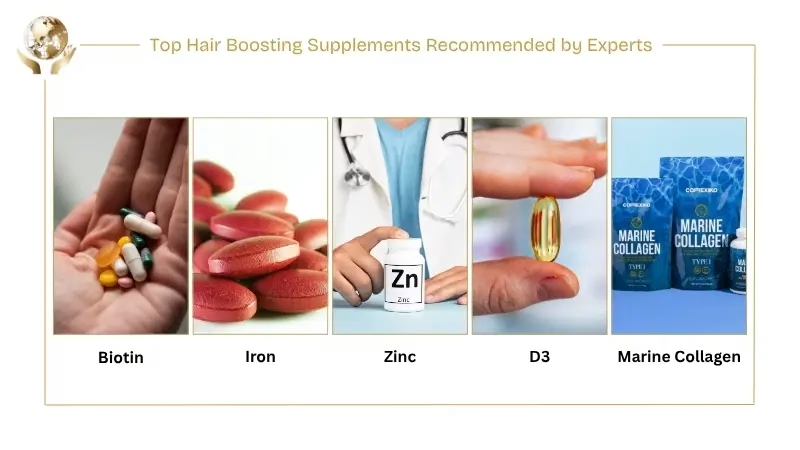
Useful ones:
- Biotin
- Iron
- Zinc
- D3
- Marine Collagen
- Folate
You can find these in many hair boosting supplements, which also benefits nails and skin.
Multivitamins that say “hair, skin, nails” are common. But, check that they are not high in vitamin A or iron unless needed. Some brands add herbs but the results vary.
Vitamins for Hair Loss: Expected Results & Timeline
Vitamins for hair loss support root repair and hair regrowth. They work internally, so visible results take time.
Timeline:
- 1–2 Weeks: Reduced hair fall during wash or brush.
- 1 Month: Less shedding and fewer weak strands.
- 2–3 Months: Thicker hair and visible new growth.
- 4–6 Months: Improved density and strength.
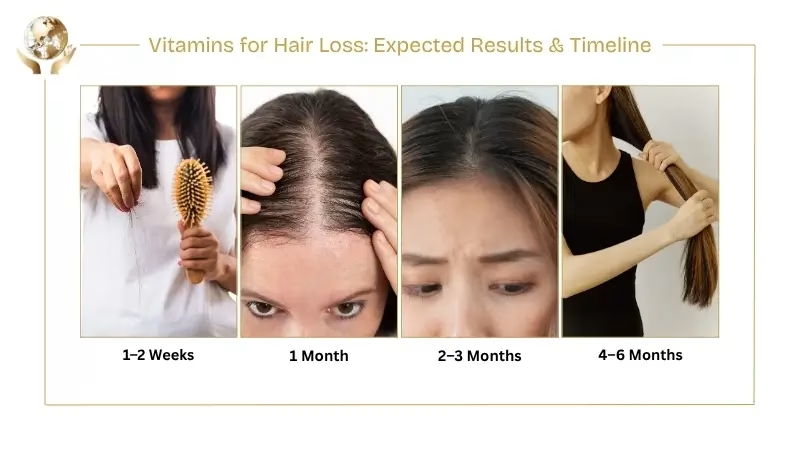
Keep taking the full dose, as hair growth needs steady support. Combining vitamins with scalp care like oil massage or derma rolling may help further.
Tips for Vitamin Absorption & Safety
To help your body utilize vitamins effectively:
- Take with food.
- Avoid coffee or tea right before taking vitamins.
- Do not mix iron with calcium.
- Drink enough water.
Do not exceed recommended dosages. Monitor your progress (e.g., with photos of your scalp) to check effectiveness. If you are considering long-term use, consult with your doctor.
Individuals having different health problems must consult a physician prior to taking supplements to grow and thicken their hair and combinations containing numerous nutrients.
See Also: Does Olaplex Cause Hair Loss

This article is medically reviewed by Medical Aesthetic Dr. Ali Khalil (PHD)
See Our Doctors & Surgeons
How effective is biotin for hair growth?
Biotin aids keratin, and minimizes breakage. With consistent use your results may be seen in 2 to 3 months.
Can vitamin D help with hair growth?
Yes, Vitamin D supports new follicles and prevents weak hair. Low vitamin D levels often lead to shedding.
What role does vitamin E play in hair growth?
Vitamin E protects scalp cells from stress and helps growth and may improve shine too.
How does vitamin A affect hair growth?
Vitamin A maintains the scalp hydrated and dryness is avoided. Low A causes dull and brittle strands.
What is the recommended dosage of vitamins for hair growth?
Recommended daily dosages vary by vitamin. Biotin ranges from 30 mcg to 5000 mcg. The recommended amount of Vitamin D in adults is 600 to 2000 IU.
Can vitamin C improve hair growth and health?
Yes, it helps make collagen and absorb iron. Both are key for stronger strands.
How long does it take for vitamins to improve hair growth?
With daily use, most people notice results in 8 to 16 weeks. Photos are used in tracking progress.
What natural vitamin sources are good for hair growth?
Eggs, berries, lentils, spinach, citrus and saltwater fish are nutritives for supporting the hair.




